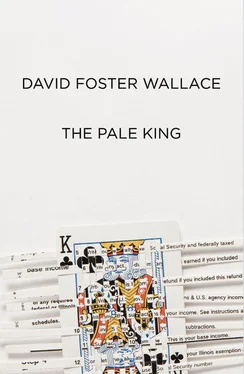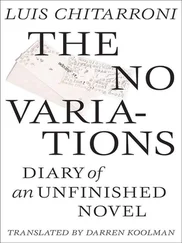‘Doesn’t sound all that new or experimental to me, Mr. Glendenning.’
‘They believed in rationality — they believed that persons of privilege, literacy, education, and moral sophistication would be able to emulate them, to make judicious and self-disciplined decisions for the good of the nation and not just to advance their own interests.’
‘It’s certainly an imaginative and ingenious rationalization of racism and male chauvinism, that’s for sure.’
‘They were heroes, and like all true heroes they were modest and didn’t regard themselves as all that exceptional. They assumed their descendants would be like them — rational, honorable, civic-minded. Men with at least as much concern for the common good as for personal advantage.’
‘How did we get from the sixties to this?’
‘And instead we get the dickless or crooked leaders we’ve got today.’
‘We elect what we deserve.’
‘But it’s something very odd. That they could have been so prescient and farsighted about erecting checks against the accumulation of power in any one branch of government, their healthy fear of government, and yet their naive belief in the civic virtue of the common people.’
‘Our leaders, our government is us, all of us, so if they’re venal and weak it’s because we are.’
‘I hate it when you synopsize what I’m trying to say and get it wrong, but I don’t quite know what to say. Because it’s stronger than that. I don’t think the problem is our leaders. I voted for Ford and I’ll likely vote for Bush or maybe Reagan and I’ll feel solid about my vote. But we see it here, with TPs. We’re the government, its worst face — the rapacious creditor, the stern parent.’
‘They hate us.’
‘They hate the government — we’re just the most convenient incarnation of what they hate. There’s something very curious, though, about the hatred. The government is the people, leaving aside various complications, but we split it off and pretend it’s not us; we pretend it’s some threatening Other bent on taking our freedoms, taking our money and redistributing it, legislating our morality in drugs, driving, abortion, the environment — Big Brother, the Establishment—’
‘The Man.’
‘With the curious thing being that we hate it for appearing to usurp the very civic functions we’ve ceded to it.’
‘Inverting the Founding Fathers’ device of ceding political power to the people instead of the government.’
‘Consent of the governed.’
‘But it’s gone farther than that, and the sixties idea of personal freedom and appetite and moral license has something to do with it, though I’m damned if I can quite figure it out. Only that something queer is going on in terms of civics and selfishness in this country, and we here in the Service get to see it in some of its most extreme manifestations. We now, as citizens and businessmen and consumers and what-all, we expect government and law to function as our conscience.’
‘Isn’t that what laws are for?’
‘You mean our superego? In loco parentis?’
‘It has something to do with liberal individualism, and something to do with the Constitution’s overestimate of individual character, and it has something to do with consumer capitalism—’
‘That’s pretty vague.’
‘It is vague. I’m not a political scientist. But it’s not vague in its consequences; the concrete reality of its consequences is what our jobs are about.’
‘But the Service has been around since long before the decadent sixties.’
‘Let him finish.’
‘I think Americans in 1980 are crazy. Have gone crazy. Regressed somehow.’
‘The quote lack of discipline and respect for authority of the decadent seventies.’
‘If you don’t shut up I’m going to put you up on the roof of the elevator and you can stay there.’
‘It may sound reactionary, I know. But we can all feel it. We’ve changed the way we think of ourselves as citizens. We don’t think of ourselves as citizens in the old sense of being small parts of something larger and infinitely more important to which we have serious responsibilities. We do still think of ourselves as citizens in the sense of being beneficiaries — we’re actually conscious of our rights as American citizens and the nation’s responsibilities to us and ensuring we get our share of the American pie. We think of ourselves now as eaters of the pie instead of makers of the pie. So who makes the pie?’
‘Ask not what your country can do for you…’
‘Corporations make the pie. They make it and we eat it.’
‘It’s probably part of my naïveté that I don’t want to put the issue in political terms when it’s probably irreducibly political. Something has happened where we’ve decided on a personal level that it’s all right to abdicate our individual responsibility to the common good and let government worry about the common good while we all go about our individual self-interested business and struggle to gratify our various appetites.’
‘You can blame some of it on corporations and advertising surely.’
‘I don’t think of corporations as citizens, though. Corporations are machines for producing profit; that’s what they’re ingeniously designed to do. It’s ridiculous to ascribe civic obligations or moral responsibilities to corporations.’
‘But the whole dark genius of corporations is that they allow for individual reward without individual obligation. The workers’ obligations are to the executives, and the executives’ obligations are to the CEO, and the CEO’s obligation is to the Board of Directors, and the Board’s obligation is to the stockholders, who are also the same customers the corporation will screw over at the very earliest opportunity in the name of profit, which profits are distributed as dividends to the very stockholders-slash-customers they’ve been fucking over in their own name. It’s like a fugue of evaded responsibility.’
‘You’re leaving out Labor Unions advocating for labor and mutual funds and the SEC’s effects on share-price over basis.’
‘You are a complete genius of irrelevancy, X. This isn’t a seminar. DeWitt’s trying to get at the heart of something here.’
‘Corporations aren’t citizens or neighbors or parents. They can’t vote or serve in combat. They don’t learn the Pledge of Allegiance. They don’t have souls. They’re revenue machines. I don’t have any problem with that. I think it’s absurd to lay moral or civic obligations on them. Their only obligations are strategic, and while they can get very complex, at root they’re not civic entities. With corporations, I have no problem with government enforcement of statutes and regulatory policy serving a conscience function. What my problem is is the way it seems that we as individual citizens have adopted a corporate attitude. That our ultimate obligation is to ourselves. That unless it’s illegal or there are direct practical consequences for ourselves, any activity is OK.’
‘I’m regretting this conversation more and more. It — you like movies?’
‘You bet.’
‘Are you kidding?’
‘Nothing like cozying up on a rainy evening with a Betamax and a good film.’
‘Suppose it was determined that the increasing violence of US films correlated with a rise in violent-crime statistics. I mean, suppose the statistics weren’t merely suggestive but actually demonstrated conclusively that the increasing number of graphically violent films like Clockwork Orange or The Godfather or The Exorcist had a causal correlation with the real-world rates of mayhem.’
‘Let’s not forget The Wild Bunch. Plus Clockwork Orange is British.’
Читать дальше












